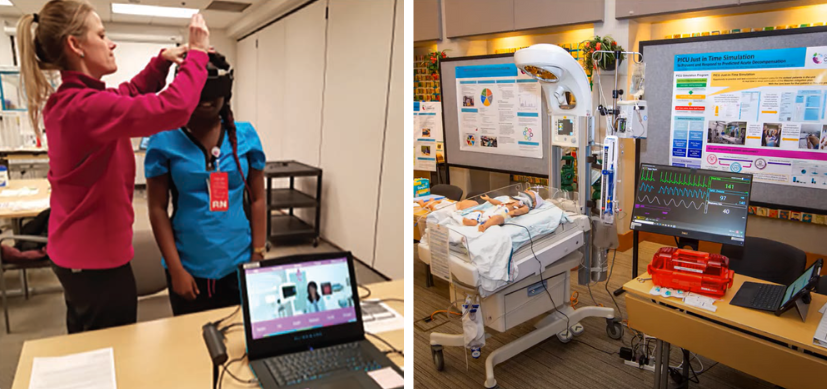Nurses Learn to Identify Respiratory Distress With VR
Research By: Matthew Zackoff, MD, MEd
Post Date: March 7, 2024 | Publish Date: March 1, 2024

VR simulation accelerates new nurses’ ability to detect respiratory issues in infants
Most pediatric hospitalizations that occur during the first year of life are caused by respiratory distress, which requires experience in direct patient care to be able to detect and assess. Newly graduated nurses face the challenge of having fewer opportunities to practice hands-on clinical care during their training than the new nurses of decades past. To help nurses recognize when critically ill pediatric patients present signs of imminent respiratory failure, Cincinnati Children’s devised a virtual reality curriculum.
A study published March 1, 2024, in the American Journal of Critical Care describes the intervention. The study included 168 nurses, with 83 in VR learning and 85 in standard training. Most had worked in their unit for less than six months before the training session. When evaluated at three and six months post training, nurses in the VR intervention were significantly more likely to correctly recognize respiratory failure, identify respiratory distress without respiratory failure, and recognize altered mental status.
Matthew Zackoff, MD, MEd, senior author, associate medical director of the Pediatric Intensive Care Unit (PICU), co-lead for digital training in the Center of Simulation and Research, and co-director of the PICU Innovation Accelerator, says that VR helps to create a safe space for new nurses to practice assessment.
“Our findings suggest the exposure to a VR curriculum may have accelerated transition-to-practice by enhancing new nurses’ abilities to recognize and interpret assessment findings,” Zackoff says.
Cincinnati Children’s co-authors included Dana Raab, MS, RN, clinical director, Patient Services Research, Cincinnati Children’s Research Foundation; Kelly Ely, MSN, RN, nurse specialist, Center of Simulation and Research, Pediatric Intensive Care Unit; Keith Israel, MSN, RN, education consultant, Patient Services; Li Lin, MS, epidemiologist/biostatistician, Division of Research in Patient Services; Amy Donnellan, DNP, APRN, nurse practitioner, Heart Institute; Jennifer Saupe, MSN, RN, director, Center for Professional Excellence, Patient Services; and Melissa Klein, MD, MEd, associate division director, Career Development and Education, Division of General and Community Pediatrics co-director, Office of Pediatric Clinical Fellowships, medical director, Online Masters of Education Program, and director, Primary Care Pathway of Pediatrics Residency Program.
| Original title: | Impact of Virtual Reality Simulation on New Nurses’ Assessment of Pediatric Respiratory Distress |
| Published in: | American Journal of Critical Care |
| Publish date: | March 1, 2024 |







